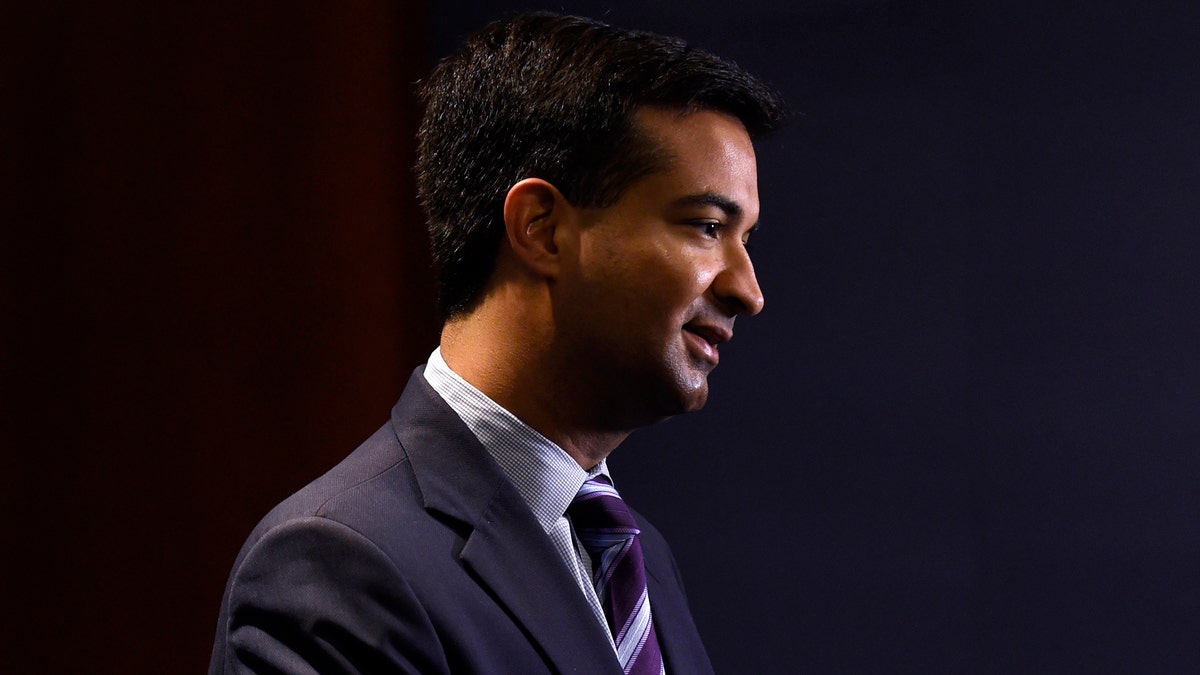
FILE - In this Nov. 13, 2014 fil photo, Rep.-elect Carlos Curbelo, R-Fla., does a television interview on Capitol Hill in Washington. (AP Photo/Susan Walsh, File)
WASHINGTON (AP) – On Capitol Hill, it's the establishment's turn.
After months where tea party lawmakers provoked crisis and unrest in Congress, even driving out a speaker, GOP leaders have turned to the business of governing, pushing forward a series of bills destined to get the president's signature.
Major highway legislation and a sweeping federal education rewrite passed the House this past week despite conservatives' objections and are expected to become law. A massive spending bill for every federal agency is in the works, as is legislation to extend dozens of tax breaks worth hundreds of billions of dollars.
Negotiations on the spending bill could melt down before Friday's deadline as conservatives push for language barring Syrian refugees and cutting money for Planned Parenthood. Yet after months of turmoil in the Capitol, where conservatives began the spring by provoking a near-shutdown of the Homeland Security Department and ended September by ousting Speaker John Boehner, R-Ohio, lawmakers are marveling that they suddenly seem to be getting things done.
"It has been pleasant to serve here for the last few weeks, which was not always the case earlier in this Congress," said Rep. Carlos Curbelo of Florida, an establishment-aligned Republican. "Don't want to get too optimistic yet, but it's certainly been a positive change."
The change comes about partly because of timing. The trauma of September and October gave way to the traditional end-of-year legislative rush, when partisan battling turns to compromise as deadlines for must-pass spending bills and other legislation come due.
In the House, Boehner's sudden departure was followed by a month of chaos as lawmakers searched for a successor. New Speaker Paul Ryan, R-Wis., was sworn in at the end of October, and has gotten high marks for making good on his promises of opening up decision-making in the House and keeping the conservatives who battled Boehner in the fold.
Other Republicans were simply tired of agreeing to the demands of a small group of tea party lawmakers who derived their power from their ability to sink legislation on the floor.
The best example is the federal Export-Import Bank, which advanced through the House in October despite opposition from GOP leaders pressured by the tea party. Business-friendly Republicans banded together on an obscure parliamentary maneuver that forced a floor vote. Despite personally opposing the measure, Ryan and Senate Majority Leader Mitch McConnell, R-Ky., acceded to including it in the final version of the highway bill, which President Barack Obama signed on Friday.
Even as conservatives find themselves on the losing end of legislative fights, their thirst for rebellion seems to have slaked and they do not seem inclined to turn on Ryan, at least not yet.
"We all realized from the outset that we weren't going to win every fight, we conservatives, but that we'd get a shot," said Rep. Matt Salmon, R-Ariz., a leading member of the hard-line Freedom Caucus. Describing Ryan, Salmon added: "True to his word he's been doing exactly what he said he'd do and that's kind of refreshing."
Some of the bills Ryan is now shepherding were developed under Boehner. The now-retired Boehner had pledged to "clean out the barn" and he signed off on a major two-year budget and debt deal. That forestalled the possibility of a default and set top-line spending levels, easing work on the current spending bill.
Other legislation, including the highway and education bills, was largely the work of the Senate.
For Ryan and the House, the true test may not come until next year, when conservatives say the new speaker no longer will get a pass. Ryan has said he intends to set a bold election-year agenda designed to show a clear contrast with Democrats. His own lawmakers will be watching to make sure he holds true to his pledges of empowering committee chairmen and individual lawmakers and hewing to "regular order" whereby legislation advances through committees, rather than getting dropped onto the floor by leadership with little debate.
For now, many GOP lawmakers are feeling cautiously optimistic. At the same time, burned by long experience with the House GOP's ability to self-destruct, most are far from declaring victory until they can see the results of upcoming negotiations on the "omnibus" spending bill that must pass by Friday or risk a partial government shutdown.
"Ask me after the omnibus how things are going," said Rep. Charlie Dent, R-Pa.




